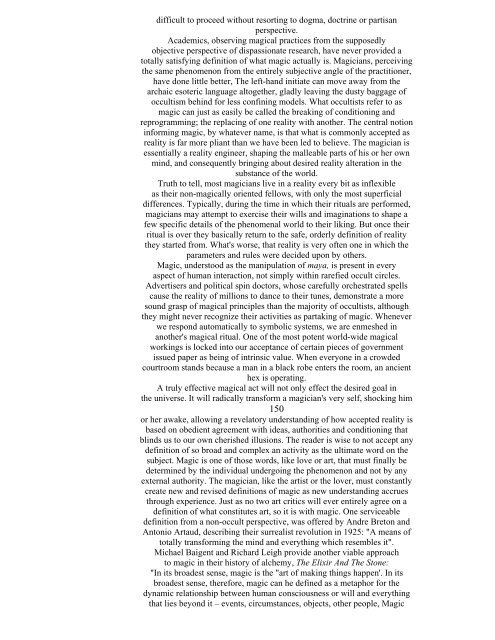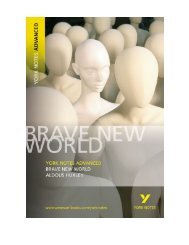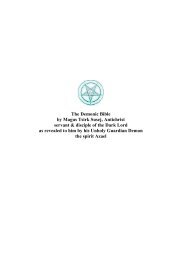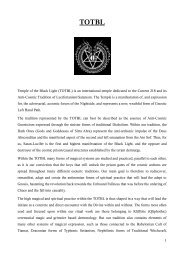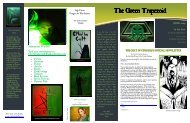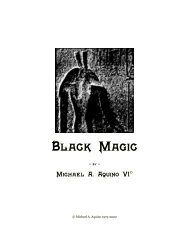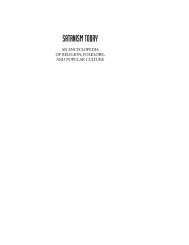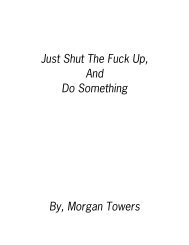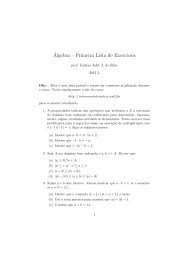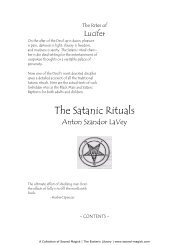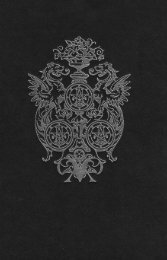I. VAMA MARGA Foundations Of The Left-Hand Path - staticfly.net
I. VAMA MARGA Foundations Of The Left-Hand Path - staticfly.net
I. VAMA MARGA Foundations Of The Left-Hand Path - staticfly.net
Create successful ePaper yourself
Turn your PDF publications into a flip-book with our unique Google optimized e-Paper software.
difficult to proceed without resorting to dogma, doctrine or partisan<br />
perspective.<br />
Academics, observing magical practices from the supposedly<br />
objective perspective of dispassionate research, have never provided a<br />
totally satisfying definition of what magic actually is. Magicians, perceiving<br />
the same phenomenon from the entirely subjective angle of the practitioner,<br />
have done little better, <strong>The</strong> left-hand initiate can move away from the<br />
archaic esoteric language altogether, gladly leaving the dusty baggage of<br />
occultism behind for less confining models. What occultists refer to as<br />
magic can just as easily be called the breaking of conditioning and<br />
reprogramming; the replacing of one reality with another. <strong>The</strong> central notion<br />
informing magic, by whatever name, is that what is commonly accepted as<br />
reality is far more pliant than we have been led to believe. <strong>The</strong> magician is<br />
essentially a reality engineer, shaping the malleable parts of his or her own<br />
mind, and consequently bringing about desired reality alteration in the<br />
substance of the world.<br />
Truth to tell, most magicians live in a reality every bit as inflexible<br />
as their non-magically oriented fellows, with only the most superficial<br />
differences. Typically, during the time in which their rituals are performed,<br />
magicians may attempt to exercise their wills and imaginations to shape a<br />
few specific details of the phenomenal world to their liking. But once their<br />
ritual is over they basically return to the safe, orderly definition of reality<br />
they started from. What's worse, that reality is very often one in which the<br />
parameters and rules were decided upon by others.<br />
Magic, understood as the manipulation of maya, is present in every<br />
aspect of human interaction, not simply within rarefied occult circles.<br />
Advertisers and political spin doctors, whose carefully orchestrated spells<br />
cause the reality of millions to dance to their tunes, demonstrate a more<br />
sound grasp of magical principles than the majority of occultists, although<br />
they might never recognize their activities as partaking of magic. Whenever<br />
we respond automatically to symbolic systems, we are enmeshed in<br />
another's magical ritual. One of the most potent world-wide magical<br />
workings is locked into our acceptance of certain pieces of government<br />
issued paper as being of intrinsic value. When everyone in a crowded<br />
courtroom stands because a man in a black robe enters the room, an ancient<br />
hex is operating.<br />
A truly effective magical act will not only effect the desired goal in<br />
the universe. It will radically transform a magician's very self, shocking him<br />
150<br />
or her awake, allowing a revelatory understanding of how accepted reality is<br />
based on obedient agreement with ideas, authorities and conditioning that<br />
blinds us to our own cherished illusions. <strong>The</strong> reader is wise to not accept any<br />
definition of so broad and complex an activity as the ultimate word on the<br />
subject. Magic is one of those words, like love or art, that must finally be<br />
determined by the individual undergoing the phenomenon and not by any<br />
external authority. <strong>The</strong> magician, like the artist or the lover, must constantly<br />
create new and revised definitions of magic as new understanding accrues<br />
through experience. Just as no two art critics will ever entirely agree on a<br />
definition of what constitutes art, so it is with magic. One serviceable<br />
definition from a non-occult perspective, was offered by Andre Breton and<br />
Antonio Artaud, describing their surrealist revolution in 1925: "A means of<br />
totally transforming the mind and everything which resembles it".<br />
Michael Baigent and Richard Leigh provide another viable approach<br />
to magic in their history of alchemy, <strong>The</strong> Elixir And <strong>The</strong> Stone:<br />
"In its broadest sense, magic is the "art of making things happen'. In its<br />
broadest sense, therefore, magic can he defined as a metaphor for the<br />
dynamic relationship between human consciousness or will and everything<br />
that lies beyond it – events, circumstances, objects, other people, Magic


